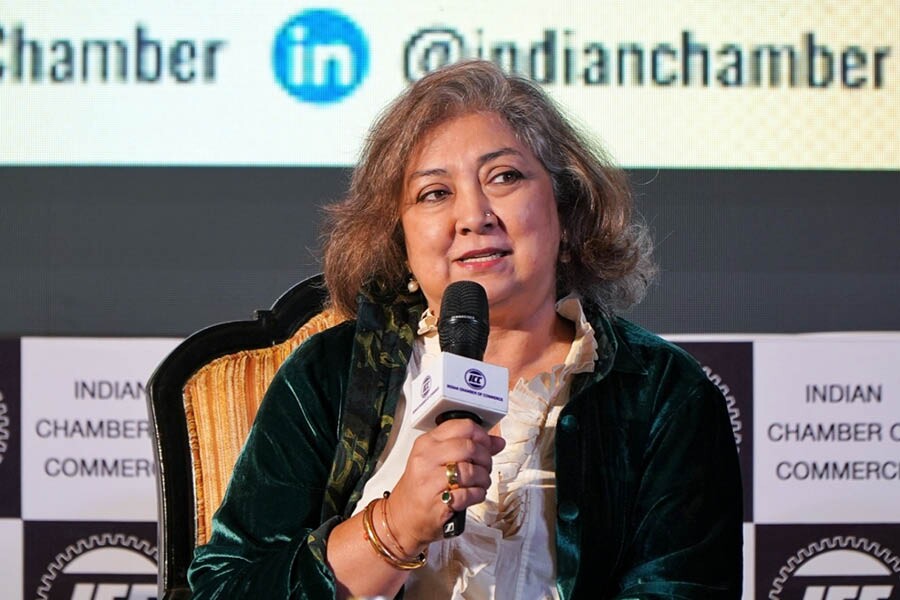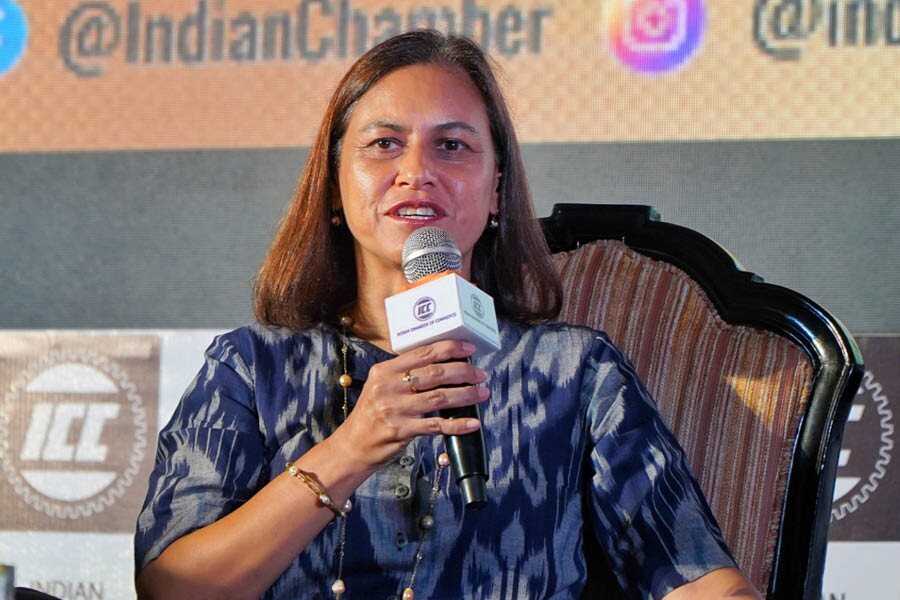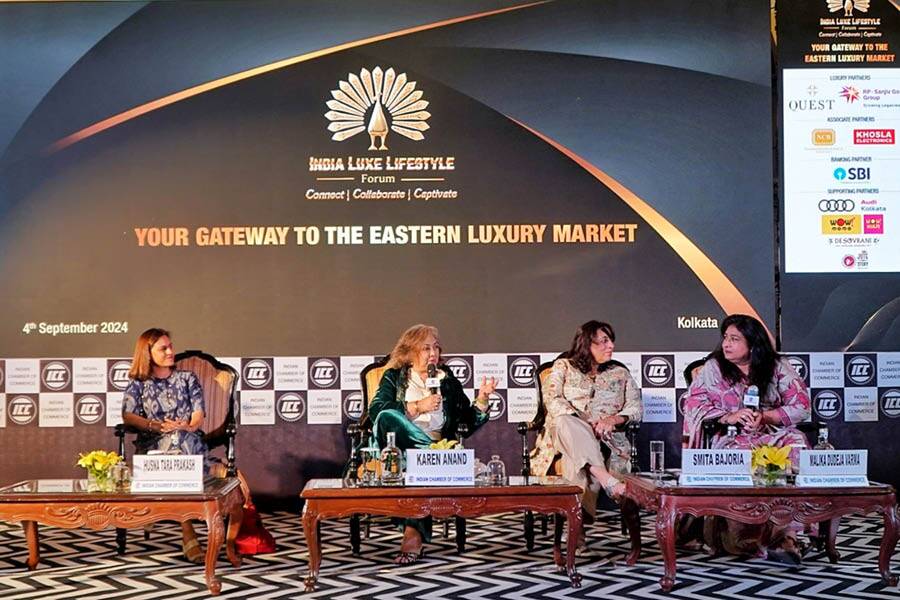Luxury isn’t about the product. It is about the experience. This theme became the focal point for The Luxe Lifestyle Forum 2024, a confluence of the industry’s leading brands, organised by the Indian Chamber of Commerce (ICC), on September 4, at Taj Bengal. My Kolkata brings you key takeaways from a panel discussion on ‘Luxury Redefined’.
Moderated by Karen Anand, a long-time entrepreneur in the food and travel industry, among other roles she holds, the session had eminent speakers from the ICC Ladies Study Group — Glenburn Tea Estate and Boutique Hotel managing director, Husna-Tara Prakash; SHE Kantha director and former LSG president Malika Dudeja Varma; and Denmark consul general, Bajoria Financial Services managing director, and Ganges Art Gallery chairperson, Smita Bajoria.

Karen Anand emphasised that if one’s product wasn’t of the highest quality, it would never qualify as ‘luxury’
Getting the basics right
Karen opened the discussion by reflecting on her own journey while starting out in the luxury food business, and how it has evolved since then. “I started with the singular goal of bringing about quality, not luxury. Interestingly, today luxury isn’t about brands, but quality,” she said.
Husna also shared how she accidentally stepped into hospitality by falling in love with a tea planter, and converted their four-bedroom bungalow in the midst of a 1,600-acre estate into a boutique hotel. “We had a simple vision: to replicate the grand life of tea planters from back in the day. In 2005, some journalists from the UK stayed with us and placed us within the top 101 hotels in the world! When I asked them why they liked us so much, they said quaintness, privacy and attention to detail are the true luxuries that the world wants. In keeping with this need for connection, we don’t try to train our staff by the rulebook. It is the innate hospitality coming from the Nepali community that our guests love,” said Husna, adding that over the course of their stay, guests would often form deep connections with the staff.
By extension, she also addressed the global fear of Artificial Intelligence replacing humans in their jobs. “The one thing AI will not replace is the feeling of sitting in a beautiful space and enjoying a cup of tea over a lovely conversation.” This exclusivity remains Glenburn’s biggest draw, with 60 people looking after just 16 guests, and their capacity being restricted to eight rooms.
Malika also emphasised how SHE-Kantha got the basics right as it travelled from mud huts to the design capitals of Milan, Paris and Venice. “Luxury is always about design, along with beauty and exclusivity. Even if we use luxurious materials, our products will feel empty unless they retain the intricate design and handiwork of artisans, customised for more contemporary outfits,” she said.

Smita Bajoria drew from her experience in both finance and art to demonstrate how purchasing art wasn’t just an aesthetic exercise, but an investment
The changing definition of luxury
Smita added that things had transformed from when she started. “Back then, there were no galleries in Kolkata. Today’s youth is exposed to all kinds of experimental and abstract art. There are serious buyers who research the artists and have developed an instinct over what will appreciate in value,” she said.
She also expressed her optimism over how the luxury space would continue to grow with the growth of India’s economy. “Indian art has come of age in the last few years. Artists who took three decades to command a crore have been able to double their price in just a couple of years. It is also an indication that the country is doing well, as the elite buy art not just for visual appeal, but as an investment,” she explained.

Malika Dudeja Varma reinforced that luxury was deeply personal, and could mean different things to different people
Malika experienced a similar trend in her industry, with global support for kantha artisans during the pandemic. “Consumers are now more conscious and are willing to pay a premium for authentic craft. Saris, where the artisan has spent two years making them, are selling for lakhs. Today, we have 1,000 women artisans with us,” she beamed.
Husna agreed that this economic boom had extended to hospitality too, with tastes of young India changing rapidly. “People are learning to appreciate the finesse in experiences. Rather than sitting in an air-conditioned jacuzzi in a five-star hotel, they want to help their children do homework amidst a forest,” she smiled.

Husna-Tara Prakash shared how Glenburn has created its own definition of luxury, deviating from opulent five stars to quaint bungalows on a tea estate
Bare minimum isn’t enough
Husna also identified Sienna Store & Cafe’s ‘bajar-to-table’ concept as a key example of changing trend, with consumers increasingly opting for the freshest high-quality local produce over generic imported ingredients. “Prices in luxury are commanded because of trust that quality will be extremely high. Malika was one of our first customers two decades ago. If she returns today, she needs to feel that the quality has remained the same, else the trust will waver,” she said.
Karen lauded many such artisanal local experiences in Bengal, adding that there was a dearth of their pan-India presence. “From gondhoraj [lebu] to smoked hilsa to kantha, this city has such a rich wealth of tradition and art that isn’t available anywhere in India. It must be spread around the country,” she said.
She also shared an anecdote from 25 years ago to show just how low the bar used to be. She had started making artisanal jams for a huge conglomerate. “One day, I got a call from the MD. They had found foreign objects in my jam.” Obsessed with quality, she immediately flew to Bombay for a personal meeting. “The MD looked me in the eye and in the name of ‘foreign object’ took out an orange slice from the jam. They were so used to flat pastes, that they didn’t know a marmalade was supposed to have natural ingredients. On the other hand, if you don’t have bits of fruit in a jam today, customers won’t trust you,” chuckled Karen.
Smita shed light on how the game isn’t about immediate gratification, but consistency. True appreciation can only happen when galleries take on the responsibility of helping artists. “Gallerists need to work closely with artists, because their entire future depends on how the gallery markets them. Only when visibility is created over decades, is there trust within the buyer.”
Nidhi Burman, senior assistant director, ICC, signed off: “Bringing together global leaders, innovators and local talent to redefine the luxury market of Eastern India was both challenging and rewarding. We aimed to create a platform that not only celebrated exclusivity, but also pushed the boundaries of what luxury means.”
